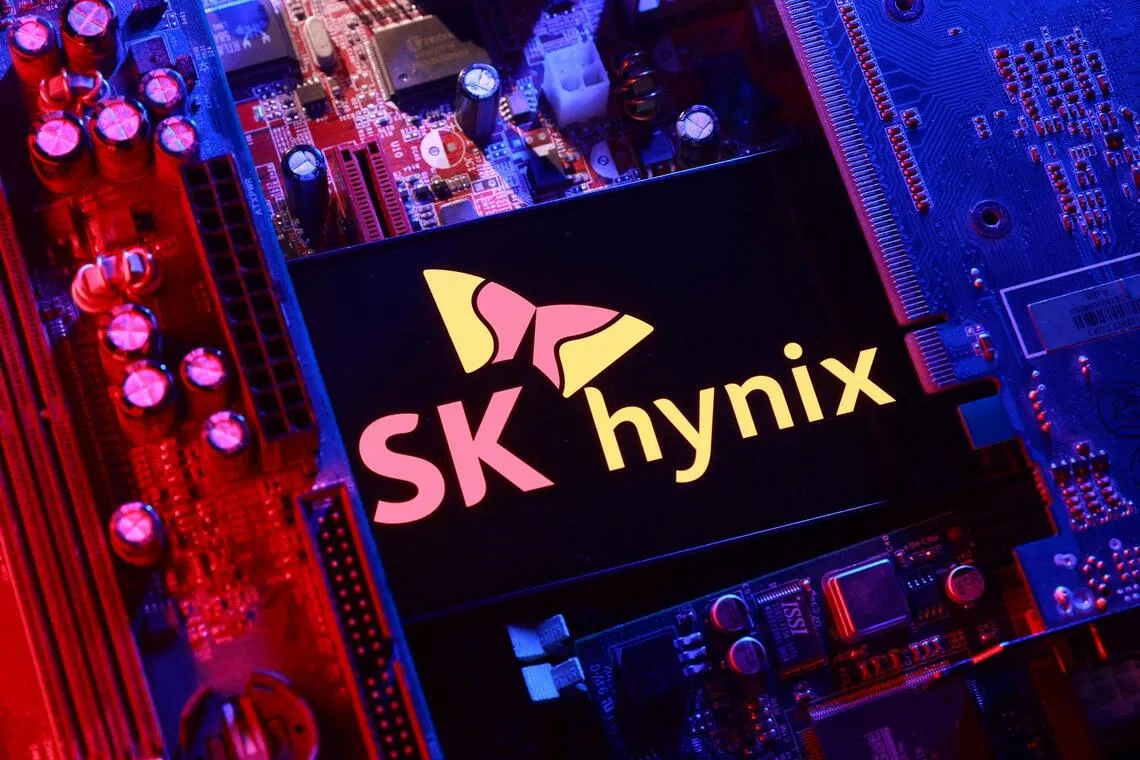Samsung, SK Hynix set to supply chips to OpenAI’s Stargate project
Sign up now: Get ST's newsletters delivered to your inbox

OpenAI will also work with SK Hynix and Samsung on building two data centres in South Korea.
PHOTO: REUTERS
Follow topic:
SEOUL - Samsung Electronics and SK Hynix have signed letters of intent to supply memory chips for OpenAI’s data centres, as South Korean chipmakers join forces with the ChatGPT maker to meet rising demand from its Stargate project.
OpenAI will also work with the two firms on building two data centres in South Korea, leveraging Seoul’s ambition to become an artificial intelligence (AI) hub in Asia and the country’s large number of paying ChatGPT subscribers – second only to that of the US.
The news sent shares of the South Korean firms soaring on Oct 2. Samsung jumped 3.5 per cent to the highest close since Jan 25, 2021, while SK Hynix leapt 9.9 per cent to an all-time high.
Their rally also propelled the benchmark Kospi index up 2.7 per cent, after earlier hitting a record high.
The announcements were made on Oct 1 after OpenAI chief executive Sam Altman met South Korean President Lee Jae Myung and the chairmen of Samsung Electronics and SK Hynix at the Presidential Office in central Seoul.
US President Donald Trump unveiled the US$500 billion (S$644 billion) Stargate project in January, charging OpenAI and partners including SoftBank and Oracle with ensuring the US remains a leader in AI. Expanding chip availability was one of the key ideas of the project, and Nvidia said last week it would invest up to US$100 billion in OpenAI and supply it with data centre chips.
South Korea’s top presidential adviser, Mr Kim Yong-beom, said OpenAI was seeking to order 900,000 semiconductor wafers in 2029, and planned to set up joint ventures with Samsung and SK Hynix to build two data centres in South Korea with an initial capacity of 20MW.
The adviser said South Korea was open to participating in financing for the Stargate project if needed.
“The significant part of the Stargate project would be impossible without memory chips from the two companies,” Mr Kim told a press briefing.
The President’s office said the partnership would give South Korean chipmakers an early foothold in the world’s largest AI infrastructure project, providing a growth opportunity for the domestic chip industry.
“We’re very excited to get to build Stargate Korea and data centre with our wonderful partners to support the sovereign AI needs of Korea,” Mr Altman said in a meeting with Mr Lee. “Korea has an industrial base like nowhere else in the world that is critical for the development of AI.”
The Presidential Office said Google has been in talks with two to three South Korean companies on AI partnership, while SK Group in June announced a 7 trillion won (S$6.4 billion) investment, including US$4 billion from Amazon Web Services, Amazon’s cloud service provider, to build a data centre in South Korea.
Samsung and SK Hynix together hold about 70 per cent of the global Dram chip market and nearly 80 per cent of the High Bandwidth Memory (HBM) market.
HBM – a type of Dram standard first produced in 2013 – involves stacking chips vertically to save space and reduce power consumption, helping to process the large volumes of data generated by complex AI applications.
Analysts estimated that 900,000 wafers of advanced Dram chips would be worth more than 100 trillion won though the figure could vary with memory market cycles.
OpenAI in 2025 set up its first office in Seoul as South Korean demand for its ChatGPT service surged.
Despite widespread expectations that AI will fundamentally change the world, investors have voiced substantial concern about a potential bubble from building too quickly. The Stargate project has been delayed by longer than expected negotiations with other parties and decisions over sites, SoftBank said in August.
Alongside the chip supply agreements, Samsung Electronics’ affiliate Samsung SDS signed a partnership with OpenAI to develop, build and operate AI data centres under the Stargate project, while also expanding enterprise AI services.
Shipbuilder Samsung Heavy Industries and construction unit Samsung C&T will jointly work with OpenAI to develop floating offshore data centres to cut cooling costs and carbon emissions. REUTERS

